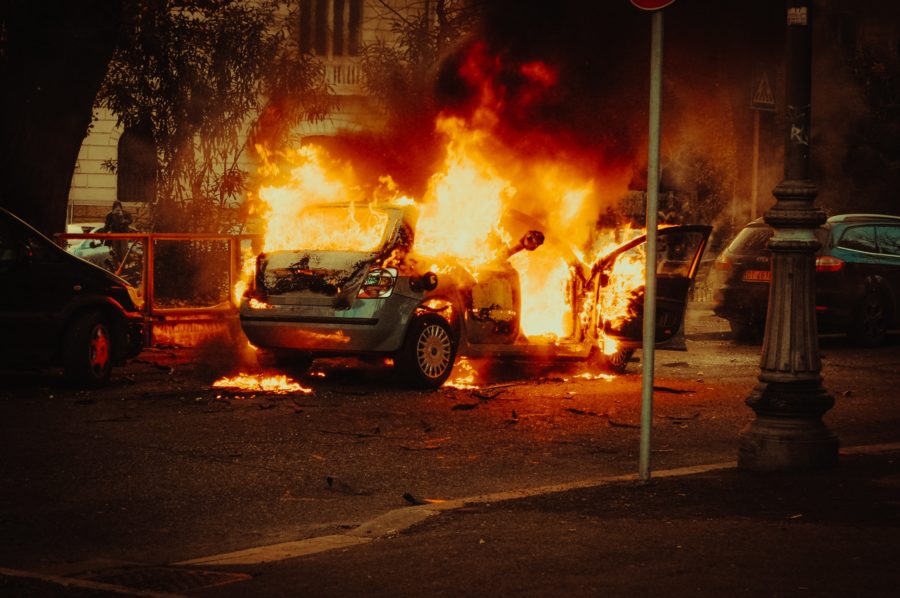
Law enforcement is a vital response to any riotous uprising. Indeed, I believe the failure to enforce the laws without apology from the start of the upheaval last week has fueled its ferocity. It would be naïve to claim that much of the violence, which is being incited and coordinated by radical groups, might not have happened anyway — these groups are always on a hair-trigger, pouncing on any opportunity to make mayhem. But how badly things get out of control has a lot to do with the resolve of state and federal law enforcement. The laws do not enforce themselves.
Progressive dogma notwithstanding, rioting spearheaded by radicals and anarchists does not exhaust itself if governments just give them time and space to get their yah-yahs out. Passivity, conveying the message that the laws will not be enforced, is provocative. It increases the appetite for rioting, which is only sated once the sociopaths have run out of things to burn and loot.
That said, law enforcement on its own is inadequate to restore order once order has been lost. Police and prosecutorial offices simply do not have the resources to quell widespread seditionist violence. Consequently, other provisions of law must be considered.
Under Article IV of the Constitution, the United States guarantees every state a republican form of government, protection against invasion, and — on request of the state government — protection from domestic violence. In furtherance of this provision, Congress enacted legislation, most notably, the Insurrection Act of 1807, which empowers the president “to suppress, in any State, any insurrection, domestic violence, unlawful combination, or conspiracy.” Obviously, suppressing such attacks requires deploying the United States armed forces as needed.
Following Hurricane Katrina, the Insurrection Act was beefed up to enable presidents to respond to natural disasters, public-health emergencies, terrorist attacks, and other catastrophic conditions. As one might expect, state governors worried that this amendment was a federal power grab that would erode the authority of state and local governments over their internal affairs, and thrust the military into domestic policing. The Posse Comitatus Act of 1878 had long barred the deployment of the armed forces for domestic law-enforcement purposes. Posse comitatus, however, has always been subject to express constitutional and statutory exceptions, and the Insurrection Act is such an exception.
One effect of the Insurrection Act and its amendments has thus been to bolster the power of the federal government to respond to domestic terrorism. Although the Constitution calls for a state to request federal assistance to combat domestic violence before the president acts, that condition is more apparent than real.
As already noted, Article IV endows the president with unilateral authority to put down insurrection and invasion. “Insurrection,” of course, is a violent uprising against the authority of the state. Therefore, it encompasses the concept of broad-scale domestic violence. The Insurrection Act codifies this reality by expressly empowering the president to suppress domestic violence and conspiracies to carry it out.
It is a fair concern that modern Insurrection Act expansions of federal power to react to natural disasters overrun federalist principles — although, as a practical matter, when states actually confront a natural disaster or pandemic, governors are quick to plead for federal assistance, rather than fret over what doing so portends for their power over their own affairs. When it comes to violent uprisings, though, federalism concerns are beside the point. Washington has an express constitutional obligation to protect the people of the states, and the republican form of government, from attack.
Federal power in this regard is also reflected by the president’s authority over the National Guard. The Guard is composed of state units, an arrangement with its roots in the colonial militias that were called into the service of the Continental Army during the Revolutionary War.
While they serve their states, National Guard units, which are reserve components of the U.S. armed forces, have over time come under increasing control of the commander in chief. They may now be deployed at the president’s direction, even overseas, regardless of whether state governors object. Clearly, if the deployment is domestic, and ordered in response to violent attacks, it is imperative that federal and state governments cooperate in the name of state and national security.
What has happened over the last few nights in major cities of the United States is unacceptable. It has gotten worse because the federal and state governments have failed to convey the signal that order will be maintained and the rule of law enforced.
That must end. The president and governors must work together to restore order, including by deployment of the military where that is necessary. The Justice Department and state law enforcement, particularly the FBI and its Joint Terrorism Task Forces, must make it clear that lawbreakers will be arrested and serious crimes will be vigorously prosecuted. Anti-America must be made to understand that America has had enough.
via National Review






Recent Comments